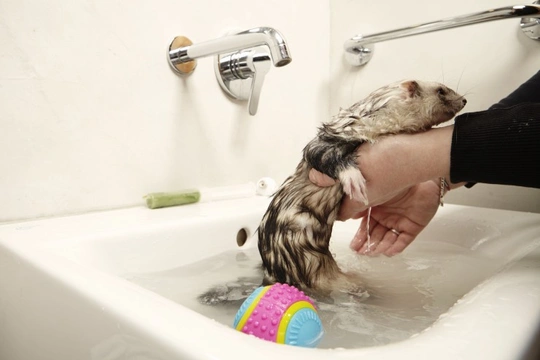
7 Top Tips to Keep Your Ferret's Home Smelling Fresh
Ferrets, particularly unneutered males, have a distinctive musky odour that can be off-putting, especially indoors. However, with proper care and hygiene, you can keep your home smelling fresh and welcoming while enjoying the company of these playful pets.
Below are seven top tips for ferret owners to manage and reduce odours effectively.
1. Spay and Neuter Your Ferret
Intact ferrets, especially males, produce a stronger musky scent due to scent glands related to mating and territorial behaviour. Neutering males or spaying females not only helps in controlling unwanted ferret odour but also promotes better health. For instance, unspayed females can face serious health issues like aplastic anaemia if left in heat too long without mating or medical intervention.
Focusing on neutering males can often be more economical and lead to a significant reduction in smell.
2. Maintain a Clean Habitat
Daily cleaning of the litter box is essential to prevent urine and faeces from building up odours around the cage. Fully clean and disinfect the enclosure weekly. Replace disposable bedding such as paper or straw regularly, and wash soft bedding and hammocks at high temperature using pet-safe detergents to remove scents and keep the environment hygienic.
3. Ensure Proper Ventilation
Place your ferret’s cage in a well-ventilated room to reduce stagnant air and musky smells lingering. Opening windows when your ferret is not roaming freely can help air the area. You might consider an air purifier to improve air quality further in the ferret's living space, especially if indoor odours are an issue.
4. Feed a High-Quality Diet
Ferrets are obligate carnivores, requiring a diet high in animal protein and fat, with minimal carbohydrates. Feeding them a properly balanced, nutritionally complete diet helps in reducing the unpleasant smell of their stools. Avoid lower quality or inappropriate foods that can cause digestive upset and stronger odours.
5. Groom Regularly but Avoid Over-Bathing
Weekly brushing stimulates healthy coat and skin while removing loose hair that might otherwise carry odour around your home. Bathing ferrets too often can cause dry skin and increase scent production as their oil glands work harder. Aim to bathe no more than once every 1-2 months or when especially odorous, using gentle ferret-friendly shampoo.
6. Separate Food and Sleeping Areas
Configure your ferret's cage so that food and water dishes are kept away from sleeping and bedding areas. This practice helps prevent food smells and moisture accumulation, reducing odour buildup in their resting spaces.
7. Use Odour-Control Products
High-quality ferret-specific litter or dust-free unscented clumping litter can help absorb moisture and odours. Sprinkling baking soda lightly on carpets in rooms where ferrets run and vacuuming afterwards can also help neutralise ferret smells embedded in fibres.
In combination, these methods promote a fresher-smelling home while supporting your ferret's health and comfort.



